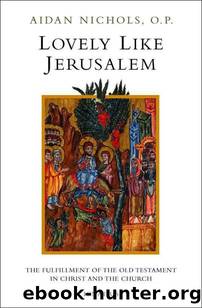Lovely Like Jerusalem by Nichols Aidan

Author:Nichols, Aidan [Nichols, Aidan]
Language: eng
Format: epub
Tags: Spiritual & Religion
ISBN: 9781586171681
Publisher: Ignatius Press
Published: 2010-01-15T05:00:00+00:00
GOD AND CREATION
The second most important theme subjacent to the principal theme common to the Old and New Testaments, the theme of the messianic hope, must surely be the theme of creation.
Creation in the Beginning
In the Book of Nehemiah, we are given the text of the great sermon preached by Ezra the scribe when, with the consent of the Persian rulers, he initiated in Jerusalem a revived life together under the Torah for the survivors of the Babylonian invasion and the returnees from Exile. (That came up in our opening âoverviewâ as a key moment in promulgating the canonical or authoritative status of the Books of Moses and possibly in finalizing the text as we have it.) It begins with the words:
Thou art the Lord, thou alone; thou hast made heaven, the heaven of heavens, with all their host, the earth and all that is on it, the seas and all that is in them; and thou preservest all of them; and the host of heaven worships thee. Thou art the Lord, the God who didst choose Abram and bring him forth out of Ur of the Chaldeans. . . (Neh 9:6-7).
In other words, Ezra speaks of creation as the work of God before he goes on to talk about the formation of Israel as a people and the consequent implanting of the great hope. This is, as the opening words of the entire Bible tell us, creation âin the beginningâ: that is, at a moment that is the first moment of time. The world has a beginning, a middle, and an end. The most important events in the middle are those exhibiting what we have been calling the âpattern of revelationââthe events leading from the call of Abraham, through the making of Israel in the Exodus, at Sinai and the entry into the Land, through all her subsequent trials and tribulations with their hard lessons, to the âChrist eventâ, by which we mean the Incarnation and the paschal mystery and the way these stupendous happenings are received in the corporate mind of the apostolic Church. It is that pattern, with its amazing issue, which points us to the end. But first there is the beginning. There is the act of creation. As one scholar has said:
In the Bibleâs own beginning, the act of creation is identified as the beginning. This need not have been the case. The act of creation might have been preceded by all kinds of esoteric histories purporting to explain its possibility; Gnostic mythologies rewrite the Genesis narrative along these lines. Alternatively, the act of creation might have been conceived as an eternal event incapable of the narrative rendering announced by the opening reference to âthe beginningâ. Or the creation of heaven and earth might have been identified with the single, constantly-unfolding world-process, the work of a God who never ceases to create, who does not rest on the first Sabbath and whose creative activity therefore cannot be confined to âthe beginningâ.
And Francis Watson continues: âThe content of the familiar opening verse of the Bible is in fact anything but obvious.
Download
This site does not store any files on its server. We only index and link to content provided by other sites. Please contact the content providers to delete copyright contents if any and email us, we'll remove relevant links or contents immediately.
The Enemy by Sarah Adams(1411)
The Switch by Beth O'Leary(1403)
Sisters by Daisy Johnson(1370)
Guard Duty by Sharon Dunn(1087)
The Christmas Killer by Alex Pine(1023)
The Chronicles of Narnia -Complete Series- by C. S. Lewis(1007)
Explosive Situation by Terri Reed(964)
Alaskan Showdown by Sarah Varland(911)
The Ruthless Billionaire by Evangeline Kelly(873)
Dangerous Women by Hope Adams(864)
Fans Only by B. Love(841)
Truth of the Divine by Lindsay Ellis(803)
The Heart's Song by Winnie Griggs(800)
Valley of Shadows by Shirlee McCoy(787)
TRUTH by James Crow(772)
World's End by Ed James(747)
Nine by Rachelle Dekker(743)
The Match by Sarah Adams(717)
Forget Me Not by Sarah M. Eden(674)
